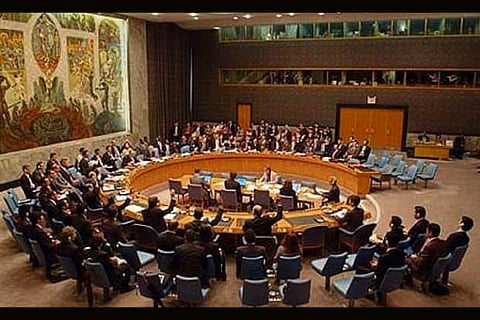

Geneva
China has withdrawn a request for a Security Council briefing on Kashmir but its envoy claimed that "discussions" on a letter from Pakistan's Foreign Minister Shah Mehmood Qureshi about the situation there was continuing among the members.
Before a meeting of the Council on Tuesday afternoon, a non-permanent European member's diplomat confirmed that China had withdrawn the request for the briefing.
He said the matter of the withdrawal was between China's Permanent Representative Zhang Jun and US Permanent Representative Kelly Craft, the Council's president for the month.
Kelly probably had a role in steering Beijing away from the talk of consultations.
Zhang's mention of "discussions" refers to unstructured conversations outside even the informal consultations mechanism of the Council for which no records are made. The claim of "discussions" was possibly made as a facesaving gesture after taking back the proposal for consultations on Kashmir, which found no takers.
Zhang told reporters, "We all know that the Security Council has received a letter from the Foreign Minister of Pakistan. There have been Security Council discussions, and discussions are going on there."
Asked by a reporter why the request for the consultation was taken back, he said, "I am not in a position to say anything more."
His media briefing focused on a resolution that Russia and China intend to introduce on North Korea asking for some of the sanctions with a humanitarian impact to be lifted and Washington and Pyongyang restart their dialogue.
If China had gone ahead with the request for the Kashmir consultations, it would have preceded an expected visit to India by Foreign Minister Wang Yi this month for talks with National Security Adviser Ajit Doval on the border issue.
Initially on Monday morning diplomatic sources said that Beijing was making a request for a closed door briefing on Kashmir for Tuesday. But subsequently there were other developments and talks that led to the decision not to proceed with it, the sources told IANS.
The letter from Pakistan that Zhang mentioned had alleged that India had removed parts of the fence on the Line of Control in five sectors and deployed Brahmos, anti-tank and other missiles were being deployed along the line.
Sources said that when China approached some Council members with the letter to make its case for a briefing on Kashmir they responded that they would rather want to see a report from the UN Military Observer Group in India and Pakistan (UNMOGIP).
There was only a small window to bring up Kashmir this year.
According to the Council's programme, it will hold its last scheduled session for the year on Thursday and next year it will be reconstituted with some five non-permanent members taking taking the place of those retiring.
China's President Xi Jinping met Prime Minister Narendra Modi at Mamallapuram in October for a cordial meeting even after China had succeeded in getting the Security Council to hold a closed door meeting on Kashmir on August 16.
The meeting ended without any diplomatic fallout and the president for that month, Poland's Permanent Representative Joanna Wronecka, did not issue any statement on the meeting because the members could not agree on one.
Permanent member France had led the opposition to the Council or its president making any statement on the issue.
There was only a small window left to bring it up Kashmir this month, which would now be an impossibility.
According to the Council's programme, it will hold its last scheduled session for the year on Thursday and next year it will be reconstituted with some new non-permanent members taking taking the place of those retiring.
Pakistan's Prime Minister Imran Khan removed Maleeha Lodhi as the country's permanent representative in September and brought back Munir Akram to intensify its diplomatic offensive against India.
Visit news.dtnext.in to explore our interactive epaper!
Download the DT Next app for more exciting features!
Click here for iOS
Click here for Android